Module 8 Unit 1 Why do you have cups onyour heads 课件(共23张PPT)
文档属性
| 名称 | Module 8 Unit 1 Why do you have cups onyour heads 课件(共23张PPT) |

|
|
| 格式 | pptx | ||
| 文件大小 | 1.6MB | ||
| 资源类型 | 教案 | ||
| 版本资源 | 外研版(三年级起点) | ||
| 科目 | 英语 | ||
| 更新时间 | 2021-03-02 23:57:07 | ||
图片预览

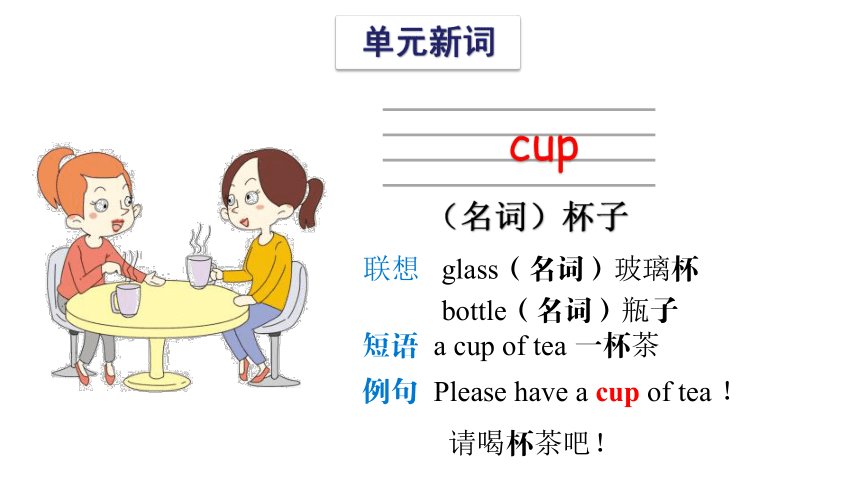
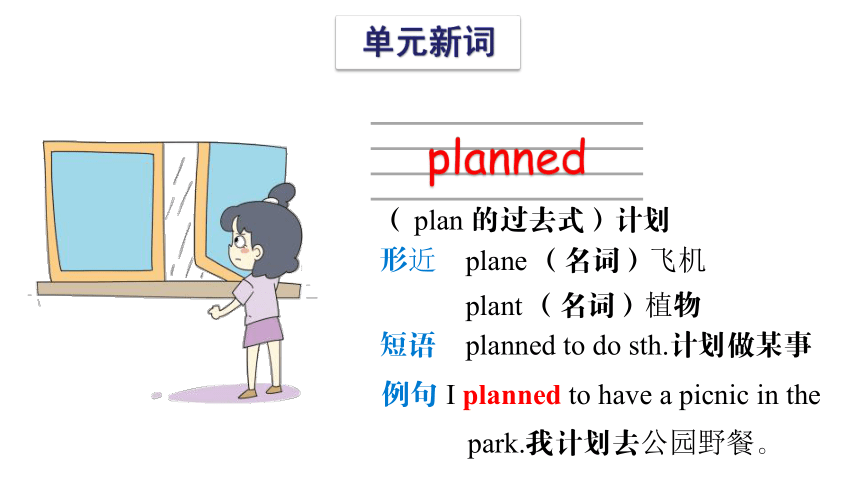
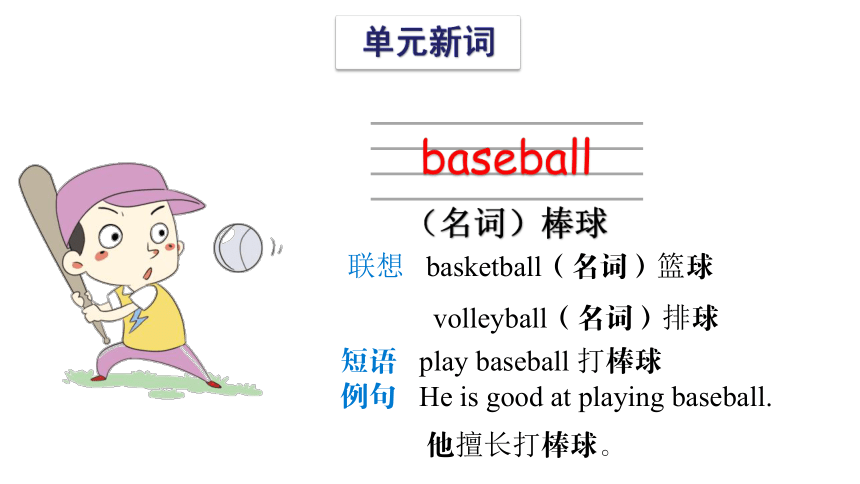
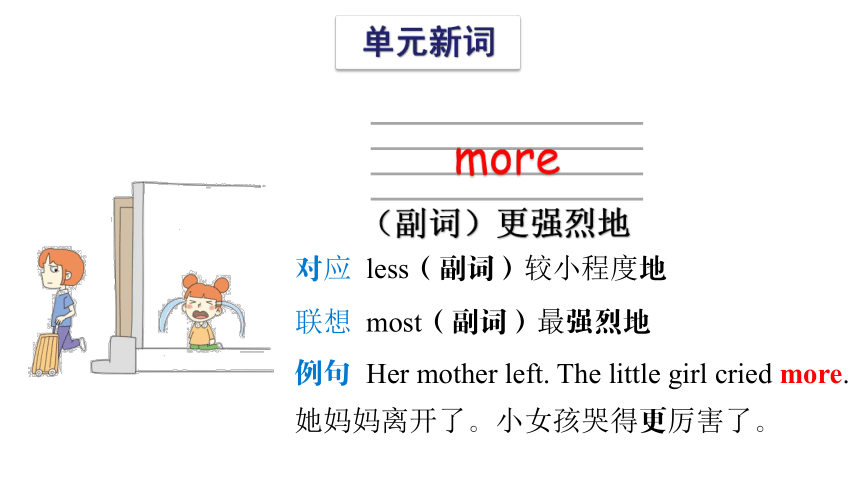
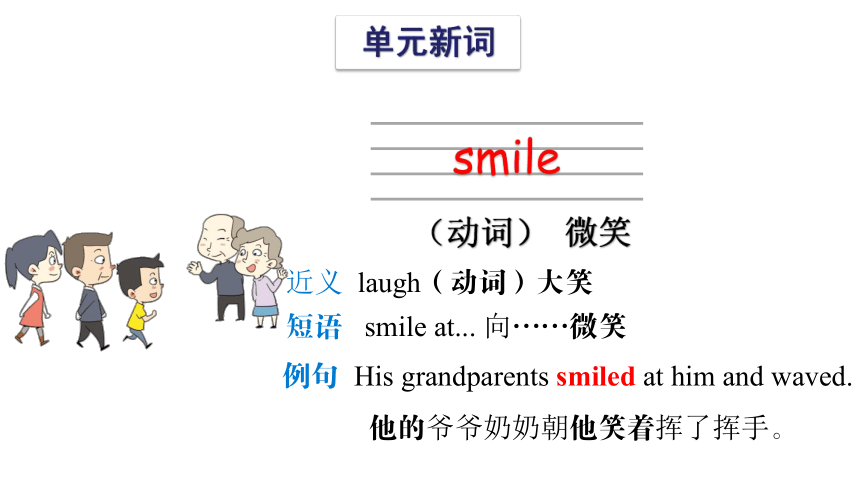
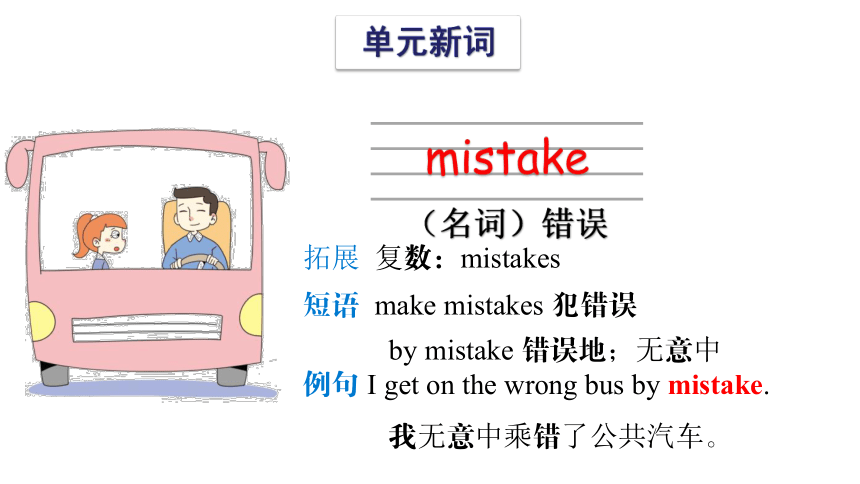
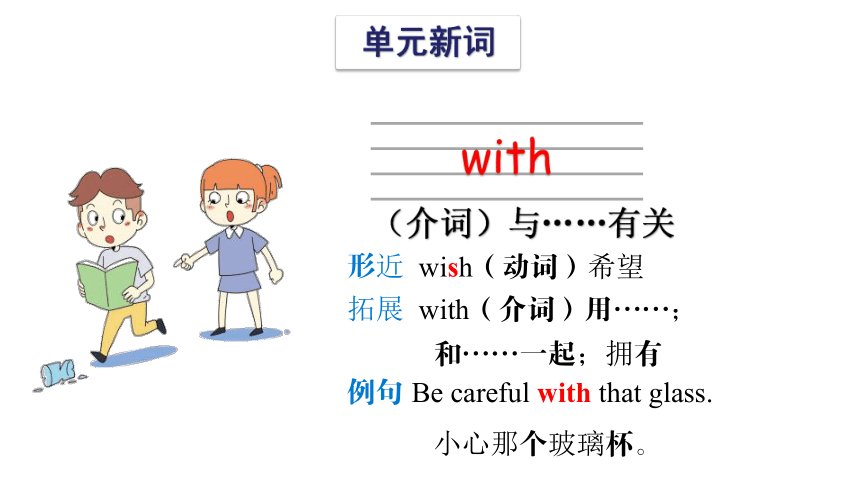
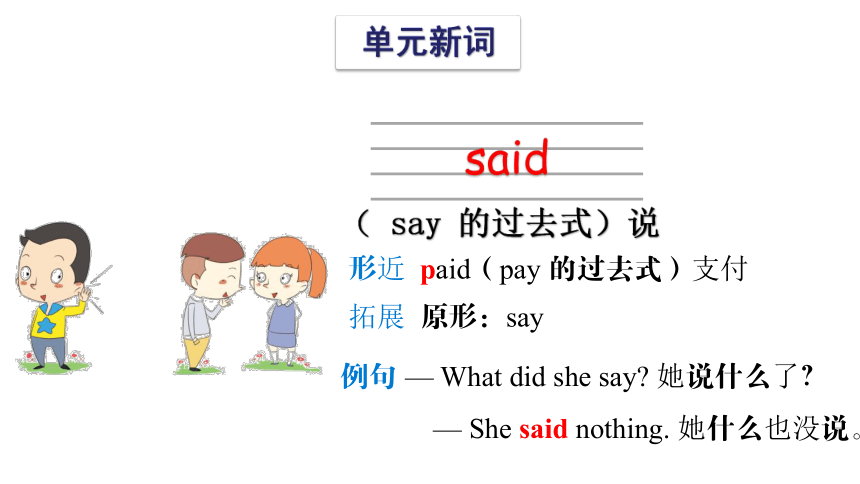
文档简介
Unit 1
Why do you have cups on
your heads?
Module 8
cup
(名词)杯子
单元新词
短语 a cup of tea 一杯茶
例句 Please have a cup of tea !
请喝杯茶吧!
联想 glass(名词)玻璃杯
bottle(名词)瓶子
planned
( plan 的过去式)计划
形近 plane (名词)飞机
plant (名词)植物
单元新词
例句 I planned to have a picnic in the park.我计划去公园野餐。
短语 planned to do sth.计划做某事
baseball
(名词)棒球
联想 basketball(名词)篮球
volleyball(名词)排球
单元新词
例句 He is good at playing baseball.
他擅长打棒球。
短语 play baseball 打棒球
more
(副词)更强烈地
联想 most(副词)最强烈地
单元新词
例句 Her mother left. The little girl cried more.
她妈妈离开了。小女孩哭得更厉害了。
对应 less(副词)较小程度地
smile
(动词) 微笑
近义 laugh(动词)大笑
单元新词
例句 His grandparents smiled at him and waved.
他的爷爷奶奶朝他笑着挥了挥手。
短语 smile at... 向……微笑
mistake
(名词)错误
拓展 复数:mistakes
单元新词
例句 I get on the wrong bus by mistake.
我无意中乘错了公共汽车。
短语 make mistakes 犯错误
by mistake 错误地;无意中
with
(介词)与……有关
形近 wish(动词)希望
单元新词
例句 Be careful with that glass.
小心那个玻璃杯。
拓展 with(介词)用……;
和……一起;拥有
said
( say 的过去式)说
形近 paid(pay 的过去式)支付
单元新词
例句 — What did she say? 她说什么了?
— She said nothing. 她什么也没说。
拓展 原形:say
Look, listen and say.
1
Where's my bag?
I put it on your bed.
Look, listen and say.
1
Why can't I see it? Oh, it's under my bed.
Listen and read.
2
Sam came into the classroom and saw some friends there. They had cups on their heads. “ Why do you have cups on your heads? Why are you laughing?” he asked.
Listen and read.
2
Daming told him the story. They planned to play a baseball game. Amy asked Lingling to bring some caps for the game. But Lingling brought some cups. They all laughed. Then they put the cups on their heads and laughed more.
Listen and read.
2
Sam smiled. “ It's easy to make mistakes with English words, ” he said. “ I make lots of mistakes with Chinese words too. Now look what's in my bag!” Sam opened his bag. There were baseball caps! “ Hooray!” everyone shouted. They put the caps on. Then they went to the playground and played baseball together.
Where's my bag? 我的包在哪里?
“ Where+be 动词 +名词/代词?”意为“……在哪里?”,用来询问某人或某物所处的位置,be动词的形式根据其后的主语而定。回答时用“主语+be动词+表示位置的介词短语”。
知识讲解
1
例句: —Where is my pen? 我的钢笔在哪里?
— It's on the desk. 它在书桌上。
Why do you have cups on your heads?
为什么你们的头上顶着杯子?
知识讲解
why是疑问副词,意为“为什么”,用来询问原因、理由。
“ Why+一般疑问句?”构成特殊疑问句,其答语通常为
“ Because+ 表示原因的句子”。
2
例句:—Why do you like Maths? 你为什么喜欢数学?
—Because it's very interesting.因为它非常有趣。
“ It's easy to make mistakes with English words, ” he said. “在英语单词方面很容易犯错误,” 他说。
知识讲解
“ It's easy to do sth. ”表示“做某事很容易。”
3
例句:It is easy to work out the problem.
解出这道题很容易。
“ It's easy to make mistakes with English words, ” he said. “在英语单词方面很容易犯错误,” 他说。
知识讲解
“It's+形容词+to do sth.”表示“做某事是……的。” “It's+形容词+for+某人+to do sth.”表示“做某事对某人来说是……的。”
3
例句:It's difficult to work with him.
和他一起工作很难。
例句:It's hard for me to carry the box.
搬这个箱子对我来说很困难。
Listen and say.
3
Why do you have cups on your heads?
Listen and say.
3
Why are you laughing?
Practise.
4
Read and write. Then ask and answer.
laugh
happy
cry
sad
A: Why are you laughing?
B: Because I'm happy.
A: Why are you ______?
B: Because ___________.
crying
I'm sad
Practise.
4
shout
angry
eat
hungry
A: ________________________?
B: _________________________.
A: ________________________?
B: _________________________.
Because I'm hungry
Why are you eating
Because I'm angry
Why are you shouting
Read and write. Then ask and answer.
课时小结
词汇 : cup planned baseball more
smile mistake with said
句子 :
Where's my bag?
Why do you have cups on your heads?
“ It's easy to make mistakes with English words, ” he said.
Why do you have cups on
your heads?
Module 8
cup
(名词)杯子
单元新词
短语 a cup of tea 一杯茶
例句 Please have a cup of tea !
请喝杯茶吧!
联想 glass(名词)玻璃杯
bottle(名词)瓶子
planned
( plan 的过去式)计划
形近 plane (名词)飞机
plant (名词)植物
单元新词
例句 I planned to have a picnic in the park.我计划去公园野餐。
短语 planned to do sth.计划做某事
baseball
(名词)棒球
联想 basketball(名词)篮球
volleyball(名词)排球
单元新词
例句 He is good at playing baseball.
他擅长打棒球。
短语 play baseball 打棒球
more
(副词)更强烈地
联想 most(副词)最强烈地
单元新词
例句 Her mother left. The little girl cried more.
她妈妈离开了。小女孩哭得更厉害了。
对应 less(副词)较小程度地
smile
(动词) 微笑
近义 laugh(动词)大笑
单元新词
例句 His grandparents smiled at him and waved.
他的爷爷奶奶朝他笑着挥了挥手。
短语 smile at... 向……微笑
mistake
(名词)错误
拓展 复数:mistakes
单元新词
例句 I get on the wrong bus by mistake.
我无意中乘错了公共汽车。
短语 make mistakes 犯错误
by mistake 错误地;无意中
with
(介词)与……有关
形近 wish(动词)希望
单元新词
例句 Be careful with that glass.
小心那个玻璃杯。
拓展 with(介词)用……;
和……一起;拥有
said
( say 的过去式)说
形近 paid(pay 的过去式)支付
单元新词
例句 — What did she say? 她说什么了?
— She said nothing. 她什么也没说。
拓展 原形:say
Look, listen and say.
1
Where's my bag?
I put it on your bed.
Look, listen and say.
1
Why can't I see it? Oh, it's under my bed.
Listen and read.
2
Sam came into the classroom and saw some friends there. They had cups on their heads. “ Why do you have cups on your heads? Why are you laughing?” he asked.
Listen and read.
2
Daming told him the story. They planned to play a baseball game. Amy asked Lingling to bring some caps for the game. But Lingling brought some cups. They all laughed. Then they put the cups on their heads and laughed more.
Listen and read.
2
Sam smiled. “ It's easy to make mistakes with English words, ” he said. “ I make lots of mistakes with Chinese words too. Now look what's in my bag!” Sam opened his bag. There were baseball caps! “ Hooray!” everyone shouted. They put the caps on. Then they went to the playground and played baseball together.
Where's my bag? 我的包在哪里?
“ Where+be 动词 +名词/代词?”意为“……在哪里?”,用来询问某人或某物所处的位置,be动词的形式根据其后的主语而定。回答时用“主语+be动词+表示位置的介词短语”。
知识讲解
1
例句: —Where is my pen? 我的钢笔在哪里?
— It's on the desk. 它在书桌上。
Why do you have cups on your heads?
为什么你们的头上顶着杯子?
知识讲解
why是疑问副词,意为“为什么”,用来询问原因、理由。
“ Why+一般疑问句?”构成特殊疑问句,其答语通常为
“ Because+ 表示原因的句子”。
2
例句:—Why do you like Maths? 你为什么喜欢数学?
—Because it's very interesting.因为它非常有趣。
“ It's easy to make mistakes with English words, ” he said. “在英语单词方面很容易犯错误,” 他说。
知识讲解
“ It's easy to do sth. ”表示“做某事很容易。”
3
例句:It is easy to work out the problem.
解出这道题很容易。
“ It's easy to make mistakes with English words, ” he said. “在英语单词方面很容易犯错误,” 他说。
知识讲解
“It's+形容词+to do sth.”表示“做某事是……的。” “It's+形容词+for+某人+to do sth.”表示“做某事对某人来说是……的。”
3
例句:It's difficult to work with him.
和他一起工作很难。
例句:It's hard for me to carry the box.
搬这个箱子对我来说很困难。
Listen and say.
3
Why do you have cups on your heads?
Listen and say.
3
Why are you laughing?
Practise.
4
Read and write. Then ask and answer.
laugh
happy
cry
sad
A: Why are you laughing?
B: Because I'm happy.
A: Why are you ______?
B: Because ___________.
crying
I'm sad
Practise.
4
shout
angry
eat
hungry
A: ________________________?
B: _________________________.
A: ________________________?
B: _________________________.
Because I'm hungry
Why are you eating
Because I'm angry
Why are you shouting
Read and write. Then ask and answer.
课时小结
词汇 : cup planned baseball more
smile mistake with said
句子 :
Where's my bag?
Why do you have cups on your heads?
“ It's easy to make mistakes with English words, ” he said.
同课章节目录
- Module 1
- Unit 1 I want a hot dog,please.
- Unit 2 What do you want to eat?
- Module 2
- Unit 1 When are you going to eat?
- Unit 2 It will snow in Harbin
- Module 3
- Unit 1 The sun is shining.
- Unit 2 The cows are drinking wate
- Module 4
- Unit 1 The balloons are flying away!
- Unit 2 The apples are falling down the stairs
- Module 5
- Unit 1 He is playing the suona, but the phone ring
- Unit 2 He's riding his bike,but it's starting to r
- Module 6
- Unit 1 It was Daming's birthday yesterday.
- Unit 2 The name of the spaceship is Shenzhou V.
- Module 7
- Unit 1 He spent about twenty-one hours in space.
- Unit 2 She couldn't see or hear .
- Module 8
- Unit 1 Why do you have cups on your heads?
- Unit 2 Why are you wearing a hat?
- Module 9
- Unit 1 Best wishes to you.
- Unit 2 Wishing you happiness every day.
- Module 10
- Unit 1 We are going to different schools.
- Unit 2 What are you going to study?
- Review Module
- Unit 1
- Unit 2
